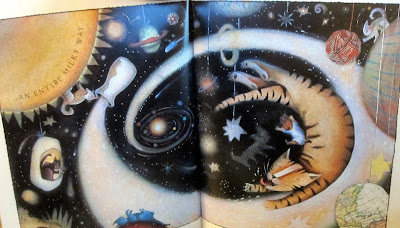Take Diary of a Worm by Doreen Cronin, for example.
On the first page, it introduces the idea that the world is much bigger than just us. Then it goes on to talk about the specifics of our world... from the perspective of a worm, but in the context of something much larger.
Simple, but effective.
Or take this book:
Tuesday opens up the idea that everything is weirder than you can imagine...
...that anything is possible...
...and that you can never predict tomorrow. In addition, there aren't any words in the book, so it allows you to tell the story yourself.
The Magic School Bus uses facts. It says "look how amazing the universe is. For real!"
...except for the whole "magic" part...
If you check out Baloney (Henry P.) by Jon Scieszka and Lane Smith, it takes the total opposite approach - take a look at the immense potential for exploration that is available just inside your own mind.
Also it has fantastic pictures.
But my favourite of all has to be The Big Pets by Lane Smith. First of all, the illustrations are spectacular (you may notice that the images are oddly similar to the illustrations in Baloney)...
...and secondly, it takes you from simple, wonderful, and calm imaginary place where the girl is small and the cat is big...
...to the massive majesty and awe of the universe in one two-page spread. I could stare at this page all day.
 |
| ...with the milk and the cat and cat toys and the stars and the globe in the corner there and the yarn and the little cat houses and all of the cats! |
Children's stories are great, and if you keep looking and reading, you'll find the perfect one: a story that opens up the whole of the universe just for you in just a few short pages.













Children's stories are great, but not only for the story. they often contain universal truth, instruction for life, inspiration and encouragement to imagine things beyond our everyday lives.
ReplyDeleteI absolutely agree! They communicate universal truths simply and concisely, in a way that is accessible to anyone.
Delete